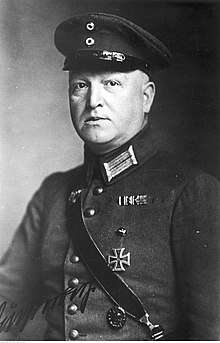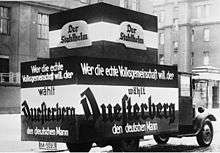Theodor Duesterberg
Theodor Duesterberg (German pronunciation: [ˈdyːstɐbɛʁk]; October 19, 1875 – November 4, 1950) was a leader of Der Stahlhelm in Germany prior to the Nazi seizure of power.
Theodor Duesterberg | |
|---|---|
 Duesterberg in uniform, ca. 1932 | |
| Deputy Federal Leader of Der Stahlhelm | |
| In office 9 March 1924 – 21 June 1933 | |
| Personal details | |
| Born | 19 October 1875 Darmstadt, Germany |
| Died | 4 November 1950 (aged 75) Hamelin, Germany |
| Political party | German National People's Party |
| Military service | |
| Allegiance | |
| Branch/service | |
| Rank | Oberstleutnant a.D. |
| Unit | Expedition to China |
| Battles/wars | Boxer Rebellion (WIA) World War I |
| Awards |
|
Background
Born the son of an army surgeon in Darmstadt, Duesterberg entered the Prussian Army in 1893 after training in the cadet corps. In 1900, Duesterberg was part of the East Asian Expedition Corps that saw action in China during the Boxer Rebellion. Two years later, Duesterberg became an officer and held a variety of army commands prior to World War I. During the war, Duesterberg served in the Prussian War Ministry and eventually attained the rank of Oberstleutnant.[1] Following the war, Duesterberg retired from the army in protest over the Versailles Treaty, which Duesterberg viewed as being extremely unfair to Germany. Duesterberg subsequently decided to enter politics and joined the German National People's Party (DNVP) in 1919.
Der Stahlhelm
After various disagreements with the party leadership, however, Duesterberg left the DNVP in 1923 and joined the nationalistic and pro-monarchy Der Stahlhelm, which largely consisted of ex-servicemen disgruntled with the Weimar Republic. Duesterberg quickly moved through its hierarchy and by 1924 was one of two of its federal leaders (the other being Franz Seldte). Together with General Georg Ludwig Rudolf Maercker, Duesterberg was one of the leaders of the extreme anti-Semitic fraction within Der Stahlhelm who wanted to ban Jews from joining, and expel all of the current Jewish members.[2] In March 1924, Maercker and Duesterberg forced Seldte to adopt the "Aryan clause" and expel all Jews from Der Stahlhelm.[3] The "Aryan clause" of 1924 was later to serve as the inspiration for similar "Aryan clauses" under the Third Reich, and in particular influenced the War Minister, General Werner von Blomberg in his attempts to keep the Wehrmacht "racially clean".[4] Under Duesterberg's leadership, Der Stahlhelm became Germany's largest para-military groups.
In the late 1920s, Duesterberg allied Der Stahlhelm with the Nazi Party and other right wing groups. In 1929 Duesterberg campaigned against the Young Plan in the referendum held in November 1929. In 1931, Duesterberg played a key role in forcing the referendum on early elections in Prussia, believing this would help polarize German politics by incorporating the moderate right into the "national" camp.[5] The leader of the German National People's Party Alfred Hugenberg had starting in 1929 embarked upon a strategy of polarization aimed at the destruction of the political center in Germany, so that the only alternatives would the Marxist parties in the form of the SPD and KPD and the right-wing "national" parties. The failure of the Prussian referendum helped to win Duesterberg away from his strategy of attempting to co-opt the moderate right into the "national" camp, and instead to work for the destruction of the moderate right as Hugenberg advocated.[6] In October 1931, Duesterberg allied Der Stahlhelmm with the Nazis, DNVP, and other right wing groups in order to form the Harzburger Front. The Harzburger Front attempted to bring about the downfall of Heinrich Brüning and the Weimar Republic, but it eventually dissolved due to Adolf Hitler’s unwillingness to subordinate the Nazi Party to such a vast right wing coalition on a long term basis. After the dissolution of the Harzburger Front, Duesterberg continued to lead Der Stahlhelm and maintained the organization’s alliance with the DNVP.
1932 presidential election

In 1932, Duesterberg was nominated by Der Stahlhelm and DNVP to run for President of Germany, but the Nazis ultimately destroyed any chance Duesterberg had of gaining mass support from the German people when they revealed he had Jewish ancestry. In April 1932, the deeply anti-Semitic Duesterberg learned for the first time that his grandfather was a Prussian Jewish doctor who converted to Lutheranism in 1818, a revelation that caused Duesterberg to suffer a nervous breakdown and to submit his resignation in shame from Der Stahlhelm.[4][7] Several of Duesterberg's friends persuaded him not to resign, and in an attempt to stay on as Der Stahlhelm deputy federal leader, he suggested new requirements for every member, namely that:
- That Der Stahlhelm members present notarized copies of church records proving that their parents, grand-parents and great grand-parents had no “Jewish blood”.[8]
- That Der Stahlhelm members swear on their word of honor that they had no personal, familial or business dealings with Jews in any form or way.[8]
- That Der Stahlhelm members present proof that their ancestors had fought in the “wars of liberation” against Napoleonic France and/or the wars of unification and on what side.[8]
- That Der Stahlhelm members present proof that they had fought in the World War and in what capacity.[8]
The revelation of Duesterberg's Jewish ancestry caused Duesterberg to poll poorly in the first ballot of the election, and he withdrew from the runoff election that followed.[1]
During the 1932 presidential elections, the Nazis went out of their way to taunt Duesterberg for having Jewish ancestry with Joseph Goebbels and Richard Walther Darré being especially vicious in their attacks. Duesterberg was so hurt by Darré's attacks that he challenged him to a duel, a challenge that Darré rejected because it was beneath him to fight a man with “Jewish blood”. Duesterberg then took up his dispute with Darré before the court of honor of the Former Officers of the 1st Hanoverian Field Artillery Regiment of Scharnhorst, number 10 to which Darré belonged. Duesterberg argued before the court of honor that Darré should be expelled for engaging in behavior that was unbecoming of a German officer while Darré argued that he had right and duty to subject Duesterberg to anti-Semitic insults. The court of honor ruled in Darré's favor, stating that he was right to insult Duesterberg for having “Jewish blood”.[8]
Ironically, Duesterberg was offered a position in Hitler's cabinet when Hitler became Chancellor of Germany in 1933, but Duesterberg flatly refused the proposal. Franz Seldte, however, did enter Hitler's cabinet,[1] which undermined Der Stahlhelm and Duesterberg's authority over the organization, and thus he resigned his leadership position in 1933.[9] In April 1933, Duesterberg was strongly urged to resign from Der Stahlhelm by President Paul von Hindenburg and the Defense Minister, General Werner von Blomberg who told him that he was now a liability to them with Hitler now chancellor.[8]
Arrest and later life
In 1934, Duesterberg was arrested by the Nazis during the Night of the Long Knives and sent to Dachau concentration camp, where he was briefly interned. After being released, he drifted into obscurity. He was known to have had limited contacts with the anti-Nazi Carl Friedrich Goerdeler in 1943, but Duesterberg ultimately did not play any role in Goerdeler's plots against Hitler. In 1949, Duesterberg wrote The Steel Helmet and Hitler, in which he defended his pre-war political career and Der Stahlhelm and detailed the movement's independence from the Nazi Party and "the insane Jew hatred preached by Hitler". A year later, Duesterberg died in Hamelin.[1]
References
- Robert Solomon Wistrich. Who's who in Nazi Germany. pp. 47–48. ISBN 0-415-26038-8.
- Wette 2007, p. 63.
- Wette 2007, pp. 63–64.
- Wette 2007, p. 64.
- Jones, Larry Eugene "Nationalists, Nazis, and the Assault against Weimar: Revisiting the Harzburg Rally of October 1931" pages 483-494 from German Studies Review Vol. 29, No. 3, October 2006 page 485.
- Jones, Larry Eugene "Nationalists, Nazis, and the Assault against Weimar: Revisiting the Harzburg Rally of October 1931" pages 483-494 from German Studies Review Vol. 29, No. 3, October 2006 pages 485-486.
- "Duesterberg, Stahlhelm Leader, Candidate for President, Says He is of Jewish Origin". Jewish Telegraphic Agency. 7 September 1932. Retrieved 15 July 2018.
- Wette 2007, p. 65.
- "Duesterberg, Steel Helmet Leader, Ousted for Jewish Descent". Jewish Telegraphic Agency. 28 April 1933. Retrieved 15 July 2018.
Further reading
- Wette, Wolfram (2007). The Wehrmacht: History, Myth, Reality. Cambridge, Mass.: Harvard University Press. ISBN 9780674025776.CS1 maint: ref=harv (link)
External links
| Wikimedia Commons has media related to Theodor Duesterberg. |